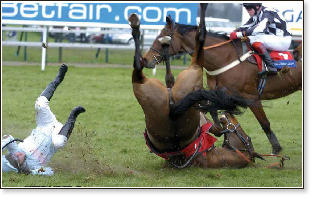Earlier this week,
Haaretz reported that Israel's Agriculture Ministry has banned the practice of denying water to calves raised for veal and demanded that calves at least four weeks old be fed with solid food. Similar regulations are already in place in the European Union.
Veal production has been singled out by the animal rights movement as one of the cruellest examples of industrialized animal agriculture (despite contentions by some that foie gras force-feeding and
the battery-cages that egg-laying chickens are confined to may be worse). In the United States, this strategy seems to have worked well: In 2001, the average American ate only half a pound of veal, down from an average of 5.6 pounds per person in 1950.
Haaretz explains why veal has earned its monstrous reputation:
Aside from withholding water, raising veal calves also involves imprisoning them in a veal crate and feeding them a milk substitute intentionally lacking in iron and other essential nutrients.
The animals suffer terribly because they are unable to move freely in the wooden restraining device and cannot turn around or even lie down and stretch. Designed to prevent movement, the crate does its job of atrophying the calves' muscles, thus producing tender veal.
The iron-deficient diet keeps the animals anemic and creates the pale pink or white color desired in the finished product. And because they are denied water, the calves are always thirsty, and are driven to drink a large quantity of the high-fat liquid feed.
Leading Jewish authorities have also claimed that veal is not quite kosher, as Dr. Richard Schwartz explains in
Judasim and Vegetarianism. In 1982, Rabbi Moshe Feinstein (who Schwartz describes as "perhaps the most influential Orthodox Jewish
halachic authority in the United States in this generation") ruled that Jews are forbidden from raising calves for veal in the inhumane manner described above. Feinstein explained that veal production is not a legimitate necessity that could justify such vast suffering. This ruling inspired Rabbi Aryeh Spero to write a two-part article in the
Jewish Press, in which he contended that animals who are too weak or sick to walk on their own are not fit for ritual slaughter. Spero suggested that the horrible conditions by which calves are raised in the veal industry mean that only about 30 percent of them should meet kosher requirements, raising concern about any kosher meat supplier with consistently higher percentages.
When animals are cute and fuzzy, it's easier to target the industries that slaughter them outright, as was evidenced this week when the U.S. Senate voted to
ban the slaugher of horses for human consumption. For many farmed animals, though, the specifically cruel processes by which they are mistreated, such as
foie gras force-feeding and induced anemia in the veal industry, make the best targets.



